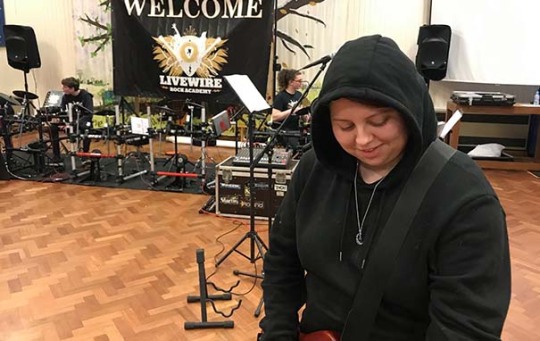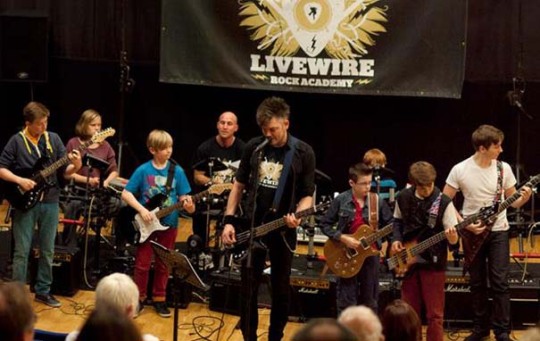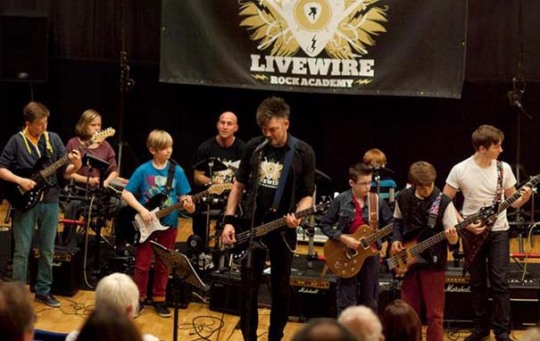Text
20 Important Benefits of Music In Our Schools

Nearly everyone enjoys music, whether by listening to it, singing, playing an instrument. But in spite of this almost universal interest, many schools are choosing to do away with their music education lesson. This is a mistake, with schools losing not only a pleasant subject, but a subject that can improve students’ lives and education. Read on to learn why music education is so important, and how it offers benefits even afar itself.
1. Musical training helps enlarge language and reasoning: Students who have early musical training will develop the areas of the brain related to language and reasoning. The left side of the brain is better enlarged with music, and songs can help engrave information on young minds.
2. A mastery of memorization: Even when performing with sheet music lessons, student musicians' academies are constantly using their memory to perform. The skill of recollection can serve students well in education and beyond.
3. Students learn to improve their work: Learning music lessons session promotes craftsmanship, and students grasp to want to create good work instead of mediocre work. This aspiration can be applied to all subjects of study.
4. Increased coordination: Students who practice with musical instruments lessons can improve their hand-eye collaboration. Just like playing sports, children can develop motor skills when playing music lessons.
5. A sense of achievement: Learning to play music lesson pieces of music on a new instrument can be a challenging, but advantageous goal. Students who master even the smallest goal in music lessons will be able to feel proud of their attainment.
6. Kids stay engaged in school: An delightful subject like music can keep kids interested and engaged in school. Student musicians' academies are likely to stay in school to achieve in other subjects.
7. Success in society: Music is the fabric of our society, and music lessons can shape capability and character. Students in band or orchestra are less likely to abuse substances over their lifetime. Musical lesson education can greatly contribute to children’s intellectual development as well.
8. Emotional development: Students of music lessons can be more emotionally developed, with empathy towards other cultures They also tend to have higher self approval and are better at coping with anxiety.
9. Students learn pattern recollection: Children flourish their math and pattern-recollection skills with the help of musical academics. Playing professional music lessons offers repetition in a fun format.
10. Better SAT scores: Students who have experience with music presentation or appreciation score higher on the SAT. One report indicates 63 points higher on verbal and 44 points higher on math for students in music appreciation academy.
11. Fine-tuned auditory skills: Musicians can better detect meaningful, information-bearing elements in sounds, like the emotional meaning in a baby’s cry. Students who practice music lessons can have better auditory attention, and pick out anticipated patterns from surrounding noise.
12. Music builds imagination and theoretical curiosity: Introducing music lessons sessions in the early childhood years can help foster a positive point of view toward learning and curiosity. Artistic education develops the whole brain and develops a child’s imagination.
13. Music can be relaxing: Students can fight stress by learning to play music lessons. Pacify music lessons are especially helpful in helping kids relax.
14. Musical instruments can teach discipline: Kids who learn to play an instrument can learn a valuable music lesson in discipline. They will have to set time aside to practice and rise to the challenge of learning with discipline to master playing their instrument.
15. Preparation for the creative economy: Investing in creative education sessions can prepare students for the 21st century workforce. The new providence has created more artistic careers, and these jobs may grow speedy than others in the future.
16. Development in innovative thinking: Kids who study the arts can learn to think creatively. This kind of education can help them solve problems by thinking outside the box and perceive that there may be more than one right answer.
17. Music can develop measurable intelligence: Students who study music lessons can improve the development of spatial intellect, which allows them to perceive the world precisely and form mental pictures. Spatial intelligence is pleasant for advanced mathematics and more.
18. Kids can learn teamwork: Many musical education programs require teamwork as part of a rock band or orchestra. In these groups, students will learn how to work together and build fellowship.
19. Responsible risk-taking: Performing a musical piece can bring fear and uneasiness. Doing so teaches kids how to take risks and deal with fear, which will help them become fortunate and reach their potential.
20. Better self-confidence: With motivation from teachers and parents, students playing a musical instrument can build pride and confidence. Musical lesson education is also likely to develop best communication for students.
0 notes
Photo

Livewire Rock Academy have a team of Professionals for Music Lessons. Learn Professional Music Lesson from our band experts. Join Now.
visit: https://www.livewirerockacademy.co.uk/music-lesson/
0 notes
Text
5 Reasons Why You Should Start a Rock Band Academy at Your School

Teaching rock bands academy in schools is a passion of mine. The kids really gravitate to it and can really inspire me. They bluster me away at every presentation. The following is a snippet from my soon-to-be published book called “Rock Teacher” where I take you through how to set up and successfully teach a rock group at your school. It is altered slightly to fit the context of this blog post but is essentially what you would find in the book.
Rock music focuses on different skills and is learned differently than more traditional categories of music. From my experience accomplishing rock music on various instruments there are skills that are given dissimilar emphasis. For eg. Reading and understanding written music is not as important or even expected as much as a good ear & the ability to fake it are. For the most part, reading and comprehension written music is not needed to be a world class rock band academy musician. Creativity occurs much more organically & naturally with this classification of music as well. You would be hard pressed to come across a rock band musician that hadn’t at least immerse in make up their own music lesson either on their own or in a group. If you are reading this post, you are already partly convinced that rock bands academy are a practicable option in music academy but if you need further reaffirmation or perhaps you need to convince a colleague or administrator, here it is:
1: ROCK BAND ENGAGES THOSE STUDENTS WHO WOULD NOT NORMALLY BE INVOLVED IN ANY OTHER MUSIC ACTIVITY IN SCHOOL
Throughout my time coaching Rock Bands Academy at my school, there is one aspect about their group composition that stands out. Most of the students involved in these rock ensembles are not engaged in any other extracurricular association. What is particularly striking about this is that boys are more likely to be hooked on playing music if this type of ensemble is offered. For anyone who has spent any period of time teaching in public schools, engaging boys in anything school related can generally be quite a challenge. Rock bands Music Academy provide equal opportunity for both boys and girls to be successful in music Session.
There is also in-class guitar lesson instruction at my school that includes students of all skill levels but does also grasp those kids who would not normally be involved in choir or rock band, or any traditional collection.
2. ROCK BAND ACTS AS AN ADVANCEMENT PROGRAM FOR GIFTED CHILDREN
We all have them, those high accomplish students that do well in all areas at school. There is just one problem—they aren’t challenged. A rock band academy can easily provide that challenge students are looking for. I have had a student in the past that would be considered a model student session who excelled in every aspect of school session and life. She also occurs to be taking Music lessons at school. Any concepts or skills we learned in the music session were beneath her. She was always one step ahead of me and many times seemed to understand music better than I did! She became a bass/keyboard player in the rock band when she was in grade 4 but easily could have made it in before that if auditions were available to students session. I challenged her and picked very keyboard and piano heavy tunes for her to play that year. There were times where we would do a tune that required her to play two separate keyboards at a time, while switching sounds on both without occur a beat. It was a challenge that she craved, and she loved it.
3. ROCK BAND BENEFICIALLY ENGAGES STUDENTS IN LEARNING
There have been at least two students that jump out to me as easily being poster children for music sessions. They found their niche through the rock band academy at school. Other ensembles can do this but they never found their niche in any other school session activity—curricular or extracurricular. At least one of them went from completely unengaged in school with behaviour problems to very polite and completely engaged due to his membership in the rock band academy at school. The best predictor of future success is past success—any success. You can read about this student in my article titled “Why Our Work Matters.”
4. ROCK BAND IS MORE RELEVANT TO STUDENTS
Rock band music is in every part. When we turn on the music, it’s there; when we go to a sporting event, it’s there; when we go to a concert, it’s there. We can’t get away from it and because of this, students know rock music academy even if they don’t realize they do. It’s hardwired into all of our DNA. When we think of music sessions in schools, the last type of music session that comes to mind is rock music lessons. Should it not be one of the first? Think of it this way: A typical physical education program in a school includes revelation to many different sports. Most of these sports are easily found outside of school and most are part of our society. Most activities and sports they play are extremely appropriate and relate perfectly to personal enjoyment outside of school. For example, hockey, at least in Canada, is considered our national winter sport and is ingrained into our society. It is played in school, and out of school. A physical education program that does not include at least floor hockey sport would be considered impious. Think of dodgeball—there are no or very few professional leagues for dodgeball and the only place it really exists is in schools. The reason recreational leagues exist now outside of school is because we all had it in school. Now, relate this to a music program—replace the word “Hockey” with the words ``Rock Band” and the word “Dodgeball” with “Concert Band.” If we eliminate music lessons that are regularly played outside of school, how is school music relevant for students? With the exception of army bands, there are no or very few professional concert bands outside of school and the only reason community bands exist is because they did it in school. So not only are rock bands extremely familiar to students, they directly relate to rock music lessons outside of school. By including it in our school music session programs, we ready our students to better compete in the real world of music session making after their lesson. On that same wavelength, student rock bands academy can connect with an assembly better than other accumulation can. Audiences love to hear music sessions they know. This is one of the main reasons cover bands do so well and the starving musician persona that plagues original rock bands exists.
5. ROCK BAND NATURALLY FOCUSES ON CREATIVITY, MEMORY
Rock band music is, by nature, creative. Having played in many types of whole throughout my career, I never feel more creative than when I play rock band music academy. There are no written parts, no chord charts, no score, and no conductor. There are many chances for writing your own music academy and improvising solos. Keep in mind, students don’t have to create whole songs to be creative. They can simply present form and arrangement ideas within a song; I call these musical session choices. I have had students make a musical session choice to change the bass session line at the end of “Eye of the Tiger” because they felt it sounded better that way. They were right, it did, and it didn’t change the togetherness of the song. Sometimes, students at my school have to make creative musical session choices just to finish a song. Some extended outros (opposite of an intro) are often impossible to recreate because they were created in the studio or they just don’t sound right in a live setting, and it is always impossible to refurbish a live fade out. Instead of agonize about how to do it, the students and I figure out a way to end the song that makes sense. Necessarily, they create their own ending for most songs that they play. These creative opportunities present themself regularly when teaching rock music academy and students can do this quite naturally and with little thought or uncertainty.
When I perform with The walkaway or with other rock band ensembles everything is performed by memory, forcing the musicians session to listen to each other more and create a tight sense of groove. Composing songs greatly helps in developing this skill because the composition literally becomes a part of you. I have had students in the rock bands academy over the years who had developed such advanced memory skills that they would only need to run a tune once or twice to get it.
Many if not all of the students in my school rock bands academy over the years developed tremendous aural skills that any university music session student would be envious of. One of the piano players that I had could read music sessions very well but had very little need to implement that skill with the band. Her ear, by grade 6, had become so developed that she could listen to something once and play it back. I have had many other instrumentalists over the years that developed ears like this. This is mostly due to the fact that rock music sessions are naturally learned by ear or by imitation.
I will have more reasons for starting a rock band at your school in the coming months. Right now, you can bask in these. Do you have any other good reasons to start a rock group at your school?
#free music lesson#music lesson#music lessons near me#music academy near me#professional music#music instruction#music school near me
0 notes
Photo

Learn Professional Guitar Lesson
Livewire Rock Academy have a team of Professionals for Guitar Lessons. Learn Professional Guitar Lesson from our band experts. Join Now.
Visit: https://www.livewirerockacademy.co.uk/guitar-lesson/
1 note
·
View note